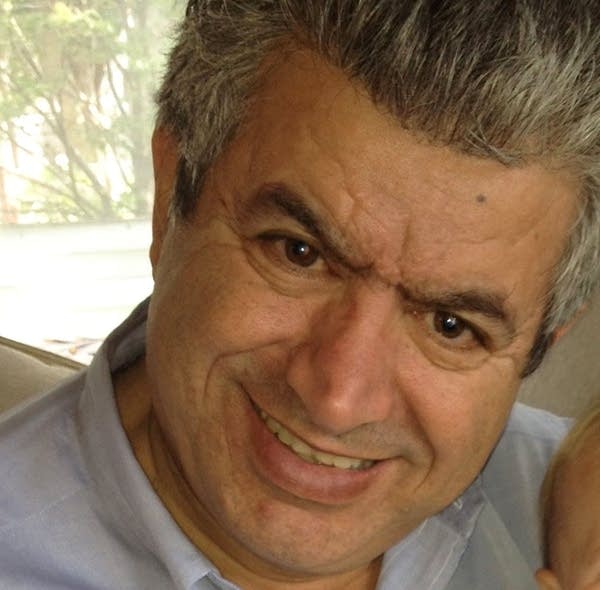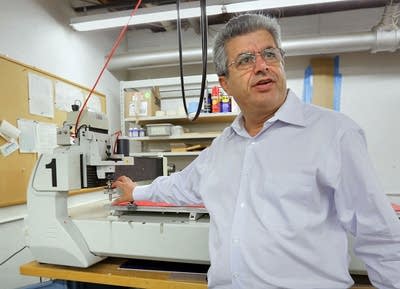Businessman, tinkerer Reuven Rahamim looked to a bright future
Go Deeper.
Create an account or log in to save stories.
Like this?
Thanks for liking this story! We have added it to a list of your favorite stories.

Reuven Rahamim was a tinkerer with an entrepreneur's DNA. He had launched a business from his basement that became known globally for manufacturing signs in Braille, using a technique he invented. Hours before he was shot and killed Thursday, he talked enthusiastically of his newest projects and the legacy he one day hoped to leave behind.
His was a classic American success story, friends and colleagues said Friday as they mourned Rahamim's death in a mass shooting at his business, Accent Signage Systems in Minneapolis. As a young sign maker arriving from Israel in the 1970s, he worked for others until he could start his own business in the mid-1980s. Rahamim built Accent into a company with more than $5 million in annual sales and 3,500 customers, rooted in the Bryn Mawr neighborhood but stretching across the world.
"He truly made a connection with people and had a passion for manufacturing. When he put the two together he would just light up," said Kathy Wilson, vice president for marketing at Advance Corp., a Cottage Grove sign making company. Rahamim was a mentor to many in the industry, she added. "There was always somewhere to be and something to build. But he would stop and ask about your family, your business, how things were going for you."
Turn Up Your Support
MPR News helps you turn down the noise and build shared understanding. Turn up your support for this public resource and keep trusted journalism accessible to all.
SPECIAL REPORT
• 5 die in workplace shooting rampage
• Remembering the shooting victims
• Mayor expresses sadness
• Photos: Minneapolis neighborhood in shock
• News Cut: The myths of workplace violence
While the company manufactured all kinds of signs, Rahamim's interest in Braille became his signature work. He found a way to embed a rounded Braille bead onto plastic signs in way that was easy on the fingers. He developed the method while working on a contract with the College of St. Catherine, which was sponsoring a program for blind students and needed signs.
Rahamim was in the right place at the right time. Soon after, the Americans with Disabilities Act became law and his method could make signs in Braille that were compliant with the law. Companies across the country relied on his technology to make Braille signs, said Dave Johnson, operations manager at Johnson Plastics in Minneapolis. "He was way ahead of his time."

As the company grew it became increasingly international and found success exporting its products. In August, the U.S. Commerce Department praised the company as a "gleaming example of a business that is successfully competing abroad, and, in doing so, is making a positive impact here at home." On a recent visit to the White House, Rahamim, 61, could point with pride to signs in Braille made using the technology he pioneered.
Rahamim was working on efforts to make products more environmentally friendly and had started offering signs made out of recycled materials. He was part of Thinc.GreenMSP, an effort by St. Paul and Minneapolis to attract and grow green manufacturing jobs in the region.
He was also developing new products, including a backlighting system for signs that he was patenting, said Todd Nelson, a freelance writer on assignment for the Star Tribune who had interviewed Rahamim for a business profile hours before the shooting. Rahhamim was "very excited about the prospects for that and credited director of operations John Souter with figuring out the math involved in making it work," Nelson said. (Souter was wounded in the shooting and remains in serious condition at Hennepin County Medical Center.)
When he heard about a shooting Thursday at Accent Signage, Johnson said he prayed Rahamim wasn't one of the victims. When he found out Rahamim was among the dead, his heart sank.
"His death is "going to have a lasting effect on this industry," Johnson said. "He was a big impact player."
As his Thursday interview with Rahamim was winding down, Nelson recalled the conversation turning to Rahamim's family and concern about the environment. "He seemed to be always thinking about the future," Nelson said, "and the kind of place he'd be leaving behind for his grandchildren."




